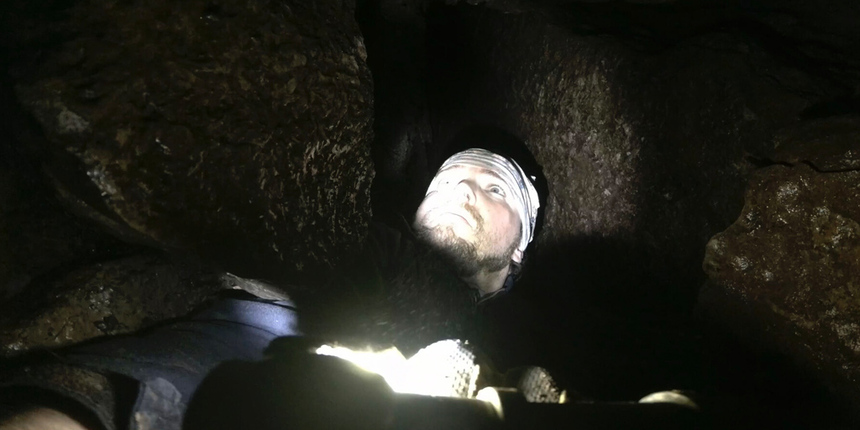Panic Fest 2024 Review: JEFFREY'S HELL Is a Brilliantly Self-Reflexive Found Footage Film

Writer/director Aaron Irons’s debut film Chest marked him as someone to watch. His sophomore effort, Jeffrey’s Hell, confirms that he’s one of the most interesting filmmakers working in the found footage horror genre.
Chest follows a documentary crew investigating an Appalachian folktale about a mysterious, and possibly haunted chest in a cave in the Jeffrey’s Hell region of eastern Tennessee. It’s a fairly straightforward found footage movie in its horror setup and payoff, but the film’s interest in the malleability and power of oral stories makes it more than just another riff on The Blair Witch Project.
Jeffrey’s Hell functions as a semi-sequel to Chest and expands that film’s interest in oral storytelling to the medium and culture of found footage itself. The film opens on an interview with Irons as he speaks about strongly considering joining the one-way journey to Mars, offered by Mars One.
He talks about recognizing it as a kind of suicide, leaving behind all the people he knew on Earth, and that being part of the appeal. Of course, Mars One never achieved its goals, forcing Irons to find another job, one with a healthy work/life balance that allowed him to make Chest.
A hard cut from the talking-head introduction to an inverted shot of the Appalachian wilderness informs us with supertext that Irons went missing in 2023 while exploring Jeffrey’s Hell. Another documentary crew, who this time are never shown, discovered the story and began investigating by speaking with the cast and crew of Chest. Some of these actors struggle with the verisimilitude, which was more forgivable in Chest, but it works to highlight that none of this is real either.
The content of the interviews also emphasizes the unreality of Jeffrey’s Hell, which ironically draws us further into the mystery of Irons’s disappearance, or at least into the film’s interest in stories. All the interviewees say that, before he disappeared, Irons was talking about a followup to Chest that would be a genuine documentary about the folklore of Appalachia; drawing attention to the medium Jeffrey’s Hell purports to be, albeit with a different focus.
Through these conversations, intercut with footage of Irons filming himself, we learn he received a mysterious email with coordinates to the cave in Jeffrey’s Hell that’s ostensibly home to the mythological chest. Despite his own (repeated) admissions that hiking and caving alone are stupid decisions and no one should do what he’s about to do, Irons sets out to find the cave. He succeeds and leaves behind a camera and some other items at the entrance before embarking into the mysterious darkness.
The very conspicuously abandoned camera leads some to question Irons’s disappearance, arguing its quintessential found footage marketing. One Chest cast member goes so far as to say: “They found exactly what he wanted them to find…It’s a gimmick.” But to what end? As it seems whatever project Irons would be drumming up interest for disappeared with him. Another of the talking heads comments that whatever footage may exist of the cave exploration is lost unless it somehow “falls out of the sky.”
Which is exactly what it does. Without spoiling specifics, it’s arguably the film’s most direct challenge to the necessity of realism in found footage films. Throughout Jeffrey’s Hell, the film pushes against the concept of believable buy-in, from the explicit discussions of gimmickry to formal found footage “rule breaking,” including cutting between multiple cameras and non-diegetic sound. Even Irons’ many remarks to the camera in every section of the film that what he’s doing is dumb feel like commentary on the requirement for characters to make bad decisions in horror movies.
Yet Jeffrey’s Hell still succeeds as a found footage horror film. The questions swirling around Irons’s disappearance are compelling enough that the film’s battle with itself in regards to realism doesn’t lessen the intrigue. Jeffrey’s Hell performs the incredible balancing act of self-reflexivity about its chosen genre and medium while still succeeding as an entry in the artform.
Much of this is due to Irons’ talent as a filmmaker, given that the back half of the film mostly just sees him wandering around underground, yet stands alongside other fantastic underground (as in caves, not as in cult) horror films like The Descent because of the camerawork and editing (Irons is also the credited cinematographer and editor). It also helps that these cave explorations almost explicitly double as a journey into the darkest parts of Irons’ mind, with him monologuing about his fear of and attraction to self-imposed exile.
Jeffrey’s Hell cements Irons as a must watch filmmaker for found footage fans, as well as anyone interested in stories and how we relate them to one another. It’s a film that builds on its predecessor that can also be taken as a standalone work. Either way, it’s made me eager to see what Irons does next.
The film screens virtually at PanicFest from April 7-14. Visit the official site for more information.
Jeffrey's Hell
Director(s)
- Aaron Irons
Writer(s)
- Aaron Irons
Cast
- Dean Shortland
- Ted Welch
- Jessejames Locorriere







